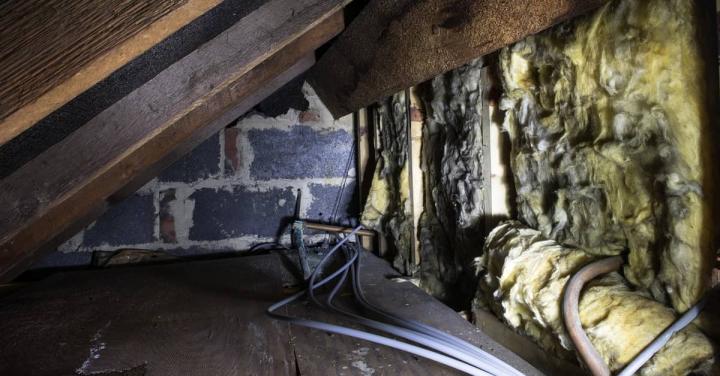You know that smell. The one you can't quite put your finger on, but you definitely notice when you walk into your home after being gone for a few hours. It's earthy, musty, maybe a little... damp? You've lit candles, used air fresheners, and even blamed the dog, but the smell keeps coming back. Plot twist: The culprit might be lurking directly beneath your feet—in your crawl space.
If you're a homeowner in the Triad area, crawl space odors are as common as traffic on I-40. But unlike traffic, you don't have to just accept them as part of life. Let's explore why your crawl space is making your home smell like a forgotten gym locker and what you can do about it.
The Stack Effect: Why Crawl Space Air Becomes Your Air
Here's something that might surprise you: up to 50% of the air you breathe on your first floor actually originates in your crawl space. Yes, really. It's called the "stack effect," and it's based on simple physics—warm air rises, creating a chimney effect that pulls air up from below.
Think of your house like a giant straw. As warm air escapes through your attic and upper floors, it creates negative pressure on lower levels, which draws replacement air from the easiest source available—your crawl space. So if your crawl space smells funky, your living space is going to smell funky too. It's not the home fragrance you were going for.
Other Ways Crawl Space Odors Infiltrate Your Home
The stack effect isn't the only sneaky way crawl space smells invade your living space:
- Leaky return ducts: If your HVAC return ducts in the crawl space have leaks, they're actively sucking crawl space air and distributing it throughout your entire house via your heating and cooling system. Congratulations, you've turned your HVAC into an odor delivery service.
- Gaps and cracks: Air leaks around plumbing pipes, electrical wires, and ductwork create convenient pathways for odors to travel upward.
- Floor penetrations: Any opening in your floor—whether it's for pipes, wires, or that mysterious hole you've been meaning to patch—is an invitation for crawl space smells to join you upstairs.
What's Causing That Smell? A Detective's Guide
Not all crawl space odors are created equal. Here's how to identify what you're dealing with:
The Musty, Earthy Smell: Mold and Mildew
This is the classic crawl space odor—that damp, musty smell that reminds you of old books or a basement that hasn't been opened in years. This odor comes from mold and mildew, which thrive in the dark, damp environment of most crawl spaces.
Mold releases microbial volatile organic compounds (mVOCs) as it consumes organic materials like wood, insulation, and paper. These mVOCs are what create that distinctive musty smell. It's essentially mold's way of saying, "Hey, I'm having a great time down here destroying your home!"
North Carolina's humid climate makes mold growth in crawl spaces practically inevitable unless you have proper crawl space sealing and moisture control in place.
The Rotten Smell: Dead Pests or Rodents
If the smell is less musty and more "something definitely died," you might be dealing with deceased wildlife. Crawl spaces are like wildlife hotels—dark, quiet, and often full of convenient entry points. Unfortunately, what checks in doesn't always check out.
Dead rodents, possums, or other creatures will create a powerful, distinctive odor that intensifies for about two weeks before gradually fading as decomposition completes. Not exactly pleasant dinner conversation.
The Sewage Smell: Plumbing Issues
If your crawl space (and by extension, your home) smells like sewage, you likely have a plumbing problem. This could be:
- A broken or cracked sewer line
- A dry P-trap allowing sewer gases to escape
- Improper venting of plumbing fixtures
- Sewage backup in the crawl space
This one requires immediate attention, as it's not just unpleasant—it's a legitimate health hazard.
The Standing Water Smell: Moisture Problems
This smell is similar to the musty mold odor but with a distinctly water-based quality. If your crawl space has standing water or persistent dampness, you'll notice a smell that's almost metallic or mineral-like, mixed with that earthy dampness.
This is a red flag that you have serious crawl space moisture problems that need addressing before they cause structural damage.
Why You Can't Just Ignore It
Maybe you're thinking, "It's just a smell. I can live with it." But crawl space odors aren't just a nuisance—they're warning signs of bigger problems:
Health Concerns
Mold spores and mVOCs can trigger allergies, asthma, and other respiratory issues. If someone in your household is sneezing more, experiencing headaches, or having breathing difficulties, crawl space mold could be the culprit.
Structural Damage
Where there's mold, there's moisture. And where there's moisture, there's eventually wood rot. Your floor joists and subfloor are structural components—if they rot, you're looking at expensive repairs (and potentially unsafe flooring).
Lower Home Value
When it comes time to sell your home, a musty smell and visible crawl space issues are major red flags for buyers. Home inspections will catch these problems, and they can derail sales or lead to significant price reductions.
Higher Energy Bills
Moisture compromises crawl space insulation, making it less effective. Your HVAC system has to work harder to maintain comfortable temperatures, which translates directly to higher utility bills.
How to Eliminate Crawl Space Odors for Good
Air fresheners and scented candles are band-aids—they cover up the smell without addressing the source. Here's how to actually solve the problem:
1. Identify and Fix the Source
Before you can eliminate odors, you need to identify their cause:
- Conduct a thorough crawl space inspection (or hire a professional to do it)
- Check for standing water, dampness, or water stains
- Look for visible mold growth on wood, insulation, or vapor barriers
- Search for dead animals or pest evidence
- Inspect plumbing for leaks or damage
- Check your HVAC ducts for leaks
2. Address Moisture Problems
Since moisture is the root cause of most crawl space odors, moisture control is essential:
- Fix any exterior drainage issues that allow water to pool near your foundation
- Repair leaking gutters and ensure downspouts direct water away from your home
- Install or repair vapor barriers on the crawl space floor
- Add French drains if necessary to redirect groundwater
- Install a sump pump if you have standing water issues
3. Crawl Space Encapsulation
This is the gold-standard solution for crawl space odors and moisture problems. Crawl space encapsulation involves:
- Installing heavy-duty vapor barriers on floors and walls
- Sealing all foundation vents
- Installing an airtight access door
- Adding a dehumidifier to maintain optimal humidity levels (45-55%)
- Sealing all air leaks and penetrations
Encapsulation creates a controlled environment that prevents moisture, odors, and mold growth. It's an investment, but it permanently solves the problem rather than temporarily masking it.
4. Install a Crawl Space Dehumidifier
Even after addressing moisture sources, North Carolina's humidity can still create problems. A crawl space dehumidifier automatically maintains ideal humidity levels, preventing mold growth and eliminating that musty smell at its source.
5. Remove Contaminated Materials
If insulation, wood, or other materials in your crawl space are mold-contaminated or water-damaged, they need to be removed and replaced. Cleaning mold off these materials is rarely effective—it just comes back.
6. Seal Air Leaks
Once your crawl space is clean and dry, seal all the pathways that allowed odors to enter your home:
- Seal gaps around plumbing pipes and electrical wires
- Repair or seal HVAC ducts
- Close off unnecessary penetrations in your floor
- Install proper weatherstripping on crawl space access doors
When to Call in the Professionals
Some crawl space issues are DIY-able—like cleaning out debris or replacing a simple vapor barrier. But for most odor problems, especially those involving mold, moisture, or structural concerns, professional help is the smart choice.
At 4 Seasons Insulation, we've seen (and smelled) it all in crawl spaces throughout Greensboro, Winston-Salem, and High Point. We can:
- Identify the source of odors
- Assess moisture and mold problems
- Recommend comprehensive solutions tailored to your specific situation
- Provide professional encapsulation and moisture control
- Ensure your crawl space is truly fixed, not just temporarily improved
The Bottom Line: Your Nose Knows
If your home has developed a strange smell that won't go away, your crawl space is the prime suspect. Those odors aren't just unpleasant—they're your home's way of telling you something's wrong down below.
The good news? Crawl space odors are fixable. With proper moisture control, encapsulation, and maintenance, you can eliminate those smells for good and protect your home from the damage that causes them.
Don't let your home smell like the set of a horror movie. If you're dealing with mysterious odors and suspect your crawl space is to blame, contact us for a free inspection. We'll identify the problem and provide honest recommendations for eliminating those smells once and for all.
Because life's too short to live in a house that smells like a swamp—even if you do live in North Carolina.



